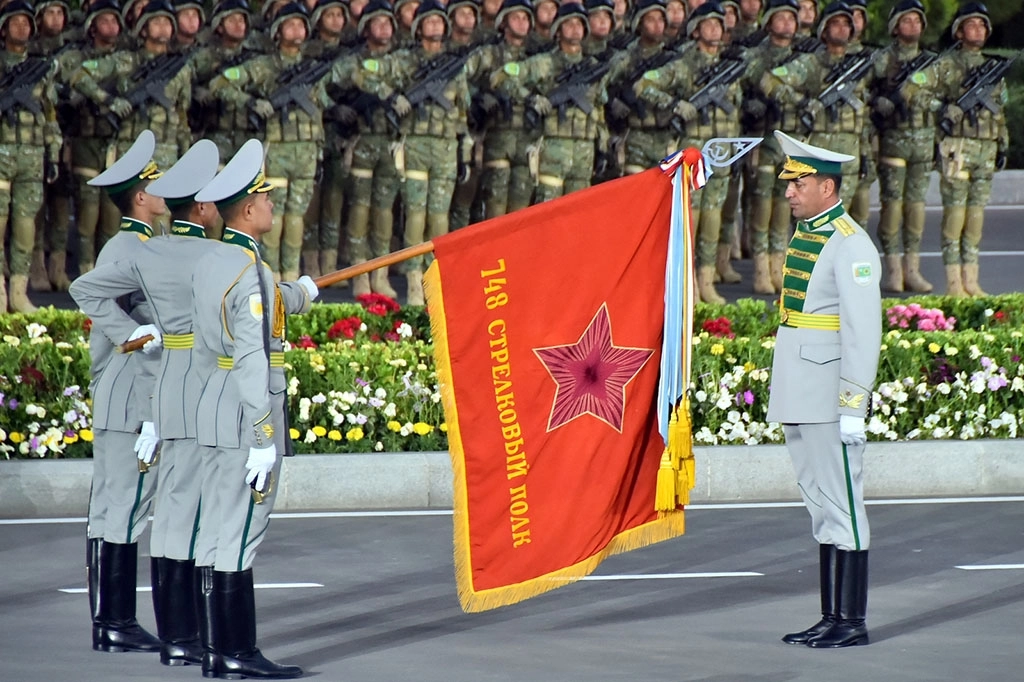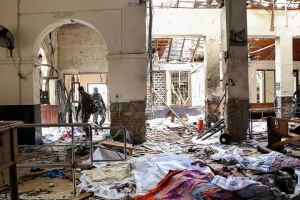In the impenetrable world of Turkmenistan’s elite, few figures other than the president have been assumed to possess any independent agency.
One of those, a figure called Alexander Zhadan who has often been described as the “eminence grise” of Turkmen politics, died last month, aged 86.
That the news of Zhadan’s passing only filtered out this past week, though, offers some indication on the degree of mystery that surrounded the man.
In its report on the death, Amsterdam-based Turkmen.news, which broke the news, recalled that Zhadan had served as the first deputy head of the presidential administration from the early years of independence through to the middle of 2019. That hints at a remarkably durable career that straddled the tenure of two wildly idiosyncratic leaders: Saparmurat Niyazov, who died in 2006, and his successor, Gurbanguly Berdymukhamedov.
This ability to retain an influential role has been attributed to a few factors, although with little certainty. One camp has it that Zhadan had served as an intermediary between Ashgabat and the Kremlin, and that he was dispatched to Turkmenistan at the willing of Moscow. Turkmen.news, at least, is skeptical on this point. The outlet notes that Zhadan was born in Turkmenistan, and that although he would go on to study mechanical engineering at Moscow’s Gubkin Russian State Oil and Gas University, he ultimately settled down in the country of his birth and married a woman from his native city, Turkmenbashi, formerly Krasnovodsk. By some accounts, he served in the Soviet armed forces during their invasion of Afghanistan.
In the dying days of the Soviet Union, Zhadan occupied a seat in the local legislature, the Supreme Soviet of the Turkmen Soviet Socialist Republic. How he negotiated his way from there into Niyazov’s inner sanctum in the early years of independence is not understood. But much has nevertheless been speculated about what precise function he served.
As befits the gray cardinal brand, it has generally been assumed that Zhadan served as a gatekeeper and provided counsel on matters of state and foreign policy, all while acquiescing to the crackpot megalomania that gripped both the presidents he served. Many analysts have cast him in the more venal guise of a shadowy money-man.
When Niyazov died in December 2006, reports circulated that Zhadan had vanished and made away with a trove of confidential documents concerning the late president’s private wealth with him for good measure.
Exiled activists long maintained that Niyazov had in effect privately held billions of dollars of public money in accounts with Deutsche Bank. Estimates on the amount varied. Advocacy group Global Witness suggested, on the basis of what appears to have been pure stab-in-the-dark guesswork, that the size of these holdings might have been as much as $3 billion.
Despite the exhortations of activists, the provenance and ultimate destination of any money that Niyazov might have squirreled away was never made subject to public scrutiny. And if Zhadan had indeed ever disappeared or been arrested, as some suggested, he reemerged by the end of 2007, when government newspaper Neutral Turkmenistan included his name among a list of signatories to a note of congratulations addressed to the new president, Berdymukhamedov, as the U.S. ambassador noted in a cable at the time.
Once again, though – as it took even the U.S. Embassy an entire year to divine, and only from open sources – that Zhadan had managed to retain his position speaks to the degree of opaqueness at play.
The government in Turkmenistan, after all, does not trade in useful and transparent information.
On April 16, President Serdar Berdymukhamedov, successor to his father, Gurbanguly, yet again trotted out familiar economic performance data. Gross domestic product has grown by 6.2 percent in the first quarter of 2023, he announced. His team evidently could not be bothered to do more than slight rewrites from his Cabinet pronouncements in April 2022, when he similarly revealed 6.2 percent growth in the first quarter. State media reports on this data from both meetings are almost word-for-word identical.
In light of such nonsense, it was more than faintly absurd to see the Foreign Ministry convene a roundtable on April 14 to discuss, among other things, the dissemination of “up-to-date and reliable information about Turkmenistan in the global digital space.”
The ministry made little secret of what it deems a dependable narrative. A press release on the roundtable invoked a speech delivered by President Berdymukhamedov at a regional conference last summer in which he worried about the “outside imposition of ideas and attitudes that run counter to the historical traditions of the peoples of Central Asia.”
What Ashgabat is pursuing is not a change of direction but a fine-tuning of its strategy. Officials spoke at the roundtable about the need to ramp up the activity of domestic private media in the country. A few such outlets exist now, although their content is often indistinguishable from state media.
This fits into two broader themes.
One is the Berdymukhamedov regime’s stated intention to gradually shrink the state apparatus. Propaganda will in future be outsourced and privatized, as happens in places like Russia, which has comfortably established itself as Turkmenistan’s most solid media partner.
But this can only happen, in the counterintuitive mindset of Turkmen officials, in conjunction with an ever-stricter stranglehold over the public’s access to the internet. Recent research conducted by a team of scholars based in the United States has found that Turkmenistan censors more than 122,000 internet domains. The implications of the indiscriminate online censorship approach were laid out in interesting detail by research team member Nguyen Phong, who spoke to Global Voices.
“The authorities block way more than people may have thought before. […] They block domains via what we call regular expressions, which is a rule-based blocking system. For example, every domain name with the word “porn” is blocked in Turkmenistan. Even if it’s not a pornography website, if it has the word porn in its name, it will be automatically blocked,” Phong told Global Voices.
Needless to say, Turkmenistan is not only concerned about people’s morals. News resources of any kind, including popular messaging apps, are subject to aggressive blocks.
As ever, a few Westerners were on hand at the Foreign Ministry roundtable to burble uselessly. Representatives of the Organization for Security and Cooperation in Europe’s Ashgabat office can always be relied upon to turn up and provide government initiatives with a gossamer-thin sheen of respectability. And maybe only the fullness of time will reveal what profound impact will have been left on Turkmen censors by U.S. Embassy press attaché Helen Shaw’s averral that “media literacy is not just a buzzword, it is a must for a thriving society.”
Source : Eurasianet










